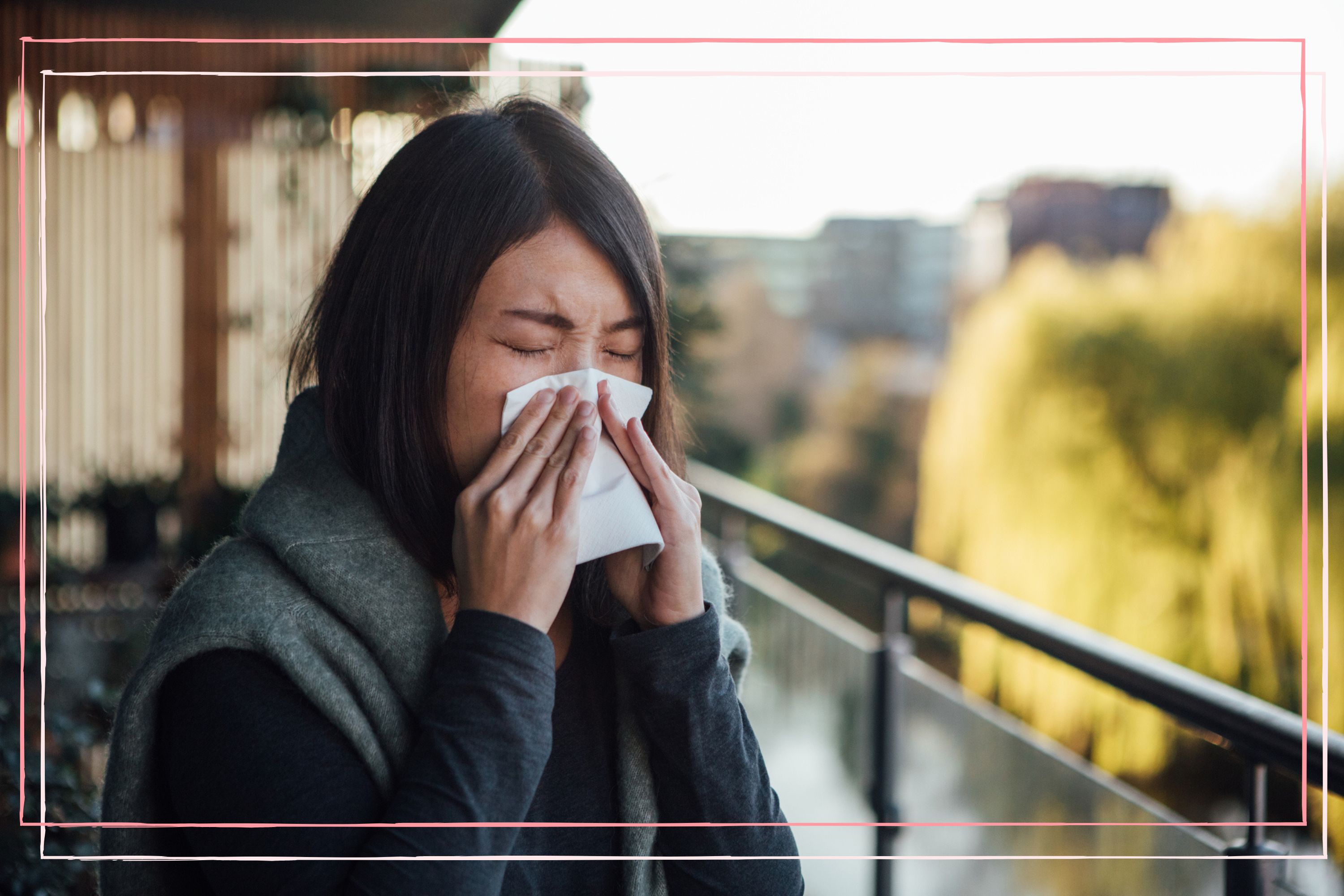Natural remedies for hay fever, recommended by doctors, that can also be used in pregnancy
These natural remedies for hay fever are recommended by doctors for calming symptoms and can be used in pregnancy to help ease discomfort.


Natural remedies for hay fever can help you proactively manage your symptoms using drug-free options, but it's always important to consult with your healthcare provider for personalised recommendations, especially if your symptoms are bad.
Hay fever symptoms are uncomfortable and bothersome at the best of times, so coping with this discomfort whilst pregnant is an unwelcome addition to the slew of other pregnancy symptoms mums-to-be are managing.
Professor Adam Fox, an expert consultant adult and paediatric allergist and immunologist we consulted for this article, says, "As anyone who suffers from hay fever will tell you – it’s no picnic, and during pregnancy, hay fever can feel that bit more troublesome due to the added confusion around which products are safe to take when it comes to preventing and relieving symptoms."
Professor Fox shared his advice with us on natural remedies for hay fever that can be used in pregnancy to help ease and calm symptoms, along with Dr Vijay Murthy, who is one of the UK’s leading Ayurvedic doctors and a fully qualified Functional Medicine Doctor.
"Understandably pregnant women are cautious when it comes to taking medication during their pregnancy, and therefore drug-free options can be worth exploring first," Professor Fox says of natural remedies for hay fever. However, if you have hay fever and your symptoms are impacting you, it's important to speak to your GP.
The information in this article is for general purposes only and does not take the place of medical advice. It is essential to be guided by your GP and take note of official NHS advice. If you are unsure, concerned about your symptoms or your symptoms worsen, then it is crucial to seek personalised advice from a doctor as soon as possible.
Natural remedies for hay fever recommended by doctors
"Easing hay fever symptoms during pregnancy requires a holistic approach that addresses both the underlying imbalances in the body and the immediate discomfort caused by allergies," says Dr Vijay Murthy. "It's essential for pregnant women with hay fever to proactively manage their symptoms and consult with healthcare providers for personalised recommendations."
Parenting advice, hot topics, best buys and family finance tips delivered straight to your inbox.
"Natural treatments like saltwater nasal sprays containing Ectoin have the dual benefit of not only relieving symptoms, but preventing them too, and being non-medicinal it’s a great way of testing what works for you without resorting to medication," Professor Fox suggests.
"Similarly, Ayurveda and Naturopathy advocate for practices like nasal irrigation with saline solution and maintaining a clean indoor environment to minimise hay fever symptoms naturally," says Dr Murthy.
Dr Murthy adds, "Additionally, steam inhalation with eucalyptus or peppermint oil can provide relief from nasal congestion and sinus pressure."
While the following suggestions from Professor Fox aren’t 'remedies' as such, they may help reduce your hay fever symptoms by limiting the amount of pollen you are exposed to day-to-day:
- Invest in a good pair of sunglasses: Wearing sunglasses (the wrap-around type are best) on sunny days can be effective at blocking the pollen getting into your eyes and causing reactions.
- Clear pollen away before you sleep: Cleaning your eyelashes and washing hair before bedtime will help to avoid pollen and allergens rubbing off on to your pillow and causing symptoms to flare-up during the night.
- Know what time of day is worst for your symptoms: Pollen counts usually rise in the morning and reach their peak by midday so heading outdoors later in the afternoon - and avoiding long periods of time outside in the mornings - can help to make spending time outdoors more manageable.
- Consider fermented foods: Having a diverse gut microbiome is associated with less allergies, so exposure to lactobacilli and bifidobacteria may help reduce symptoms.
- Shoes off indoors: Avoid bringing pollen into your home by drying clothes indoors and taking your shoes off at the door. If you have a cat or dog that has been playing outdoors, limit the amount of pollen they bring into the house by combing their fur before they come in – or get someone else to do it for you if you can!
- Cool off: If your eyes are feeling sore and itchy, try using a reusable cooling mask for 10 minutes to help soothe and relieve eyes and reduce redness and irritation.
If you’ve tried limiting your exposure to pollen and you’re still suffering badly from hay fever and finding your symptoms difficult to manage, then it’s important to make an appointment to see your GP.
"In addition to dietary and lifestyle modifications, stress-reduction techniques such as yoga, meditation, and deep breathing exercises can support overall well-being during pregnancy from both functional medicine and Ayurvedic perspectives,"Dr Murthy adds. "Herbal teas made from chamomile, ginger, and peppermint can also help soothe hay fever symptoms and promote relaxation without adverse effects on the developing foetus. Additionally, pregnant women with hay fever should prioritise rest and sleep hygiene to support immune function and overall health."
Can you take antihistamines during pregnancy?
It's really important to check with your GP before you take any medication during pregnancy or whilst breastfeeding. Not all medicines are suitable when you’re pregnant because they could pose a threat to your baby’s normal development.
Professor Fox says that there are medicines you can take during pregnancy but advises caution and speaking to your doctor first: "Loratadine or cetirizine are usually fine to take during pregnancy and whilst breastfeeding. It’s important to speak with your pharmacist or GP if symptoms are impacting you or if you’re not getting adequate relief from your current hay fever treatments. Always check the label before taking any medication to ensure it’s safe during pregnancy or speak with your pharmacist or GP if you’re unsure."
The NHS advises that you should speak to a pharmacist or GP for advice if you are pregnant or breastfeeding, "Some antihistamines may not be suitable in these cases. A pharmacist or doctor can recommend one that's best for you."
Is there any danger that hay fever and the associated symptoms can affect the pregnancy?
Professor Fox emphasises that while hay fever symptoms can make you feel uncomfortable, it is not dangerous: "Whilst hay fever can be problematic for pregnant women, and symptoms such as a blocked nose can prevent you from sleeping well, it is important to know that hay fever is not dangerous to mum or baby."
Dr Murthy explains that while hay fever isn’t dangerous to mum or baby, it’s still important to speak to a doctor and ensure your symptoms are properly managed, "While hay fever itself may not directly affect pregnancy outcomes, managing symptoms effectively can contribute to overall maternal well-being and reduce the risk of complications associated with immune dysregulation."
"Severe and uncontrolled hay fever symptoms may lead to sleep disturbances and stress, which can indirectly impact pregnancy outcomes. Therefore, it's important to address hay fever symptoms promptly and effectively during pregnancy," Dr Murthy adds.
Professor Fox debunks some common hay fever myths
Is local honey a good remedy for hay fever?
Professor Fox told us that there isn’t any truth to the suggestion that local honey is a good remedy for hay fever. "The idea that local honey can alleviate hay fever symptoms is based on the concept of immunotherapy, but scientific evidence supporting its effectiveness is very limited."
Does drinking water help hay fever?
There might be some truth to this. Professor Fox says, "There is some research to suggest that drinking water can be beneficial when struggling with allergies. Your body produces more histamines when it's dehydrated, so drinking water may potentially be good for allergies."
Dr Vijay Murthy expands, "Both functional medicine and Ayurveda emphasise the role of hydration in supporting the body's natural healing processes and reducing inflammation. Drinking plenty of water can help thin nasal secretions and alleviate hay fever symptoms. However, individual responses may vary, and it's important to maintain overall hydration levels for optimal health during pregnancy. Additionally, staying hydrated supports immune function and helps flush out toxins from the body."
Is milk good for hay fever?
Professor Fox says there’s no evidence to support this either way: "There's no evidence to suggest that milk specifically helps or worsens hay fever symptoms. There is urban mythology that suggests that dairy products, like milk and cheese, can cause your body to naturally produce more mucus which can build up and worsen your hay fever symptoms but no evidence to support this."
Can hay fever get worse in pregnancy?
Yes, there is some evidence to suggest that hay fever symptoms can feel worse or worsen while you are pregnant.
Professor Fox explains, "During pregnancy, hormonal changes can increase the chances of you feeling bunged up and under the weather, which naturally can get worse during hay fever season. Like other allergic reactions, hay fever occurs when the immune system recognises a harmless substance, such as pollen, as a potential threat. The body then reacts to it, causing symptoms. Pregnancy can influence your immune system and increase inflammation, so some pregnant women will find that they are suddenly experiencing hay fever for the first time, despite never having had it before.
"A survey of 500 pregnant women conducted by Fusion Allergy in 2023 found that over a quarter of mums-to-be felt that their symptoms got worse while they were pregnant, and 28% said it impacted how much they enjoyed their pregnancy."
The information on GoodTo.com does not constitute medical or other health advice or diagnosis and should not be used as such. Although GoodtoKnow consults a range of medical experts to create and fact-check content, this information is for general purposes only and does not take the place of medical advice. Always seek the guidance of a qualified health professional or seek urgent medical attention if needed.
Our experts

Professor Fox is a London-based Consultant Paediatric Allergist and is widely recognised as a leader in the field of Paediatric Allergy. He is one of few in the UK with higher training in this specialty and his key areas of interest include the management of the food allergy, the treatment of asthma, rhinitis (hay fever), eczema, and conjunctivitis, as well as allergies to drugs and insect stings. Professor Fox obtained a degree in Medicine and Neuroscience at the University of Cambridge and then undertook clinical training in Paediatric Allergy at University College London. Professor Adam Fox is currently working with FUSION™ Allergy Nasal Spray.

Dr. Vijay Murthy is a pioneer in the fields of integrating Functional Medicine and Ayurveda, practicing from London's Harley Street. He is engaged in personalised and holistic health care, providing transformational improvements in the health and wellbeing of his patients. A trusted confidante and health practitioner to the British Royal Family, Dr. Murthy’s expertise is globally recognised.

An internationally published digital journalist and editor, Rachael has worked for both news and lifestyle websites in the UK and abroad. Rachael's published work covers a broad spectrum of topics and she has written about everything from the future of sustainable travel, to the impact of the coronavirus pandemic on the world we live in, to the psychology of colour.